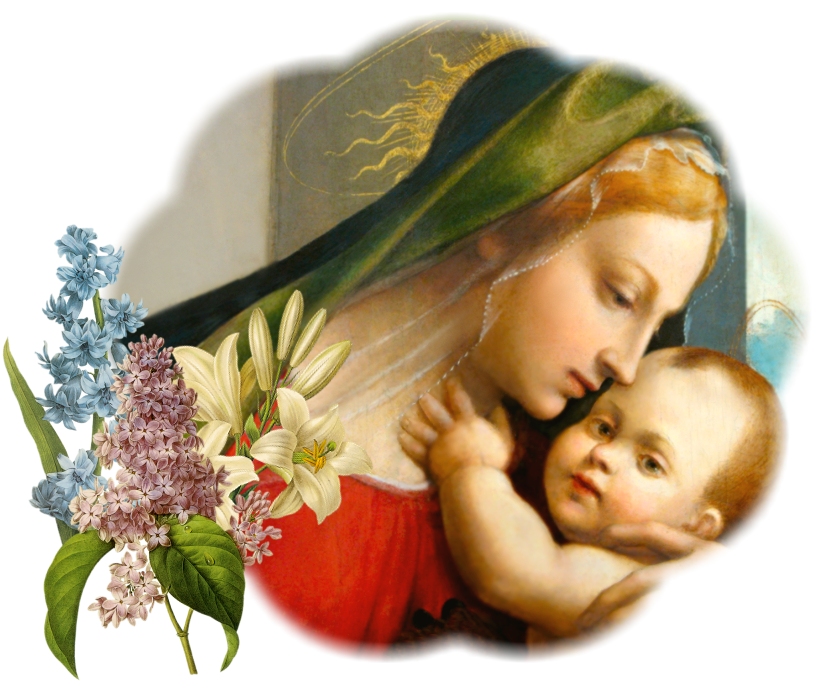

by St. Alphonsus Liguori,
Doctor of the Church
TAKEN FROM THE GLORIES OF MARY
Eccles. Approval, 1852
INTRODUCTION
OF THE HAIL MARY
NOVENAS
OF THE ROSARY AND OFFICE OF THE BLESSED VIRGIN
OF FASTING
OF VISITING THE IMAGES OF MARY
OF THE SCAPULAR
OF JOINING CONFRATERNITIES OF OUR BLESSED LADY
OF ALMS GIVEN IN MARY'S HONOR
OF HAVING FREQUENT RECOURSE TO MARY
OTHER DEVOTIONS
TWO DEDICATIONS
TOGETHER WITH INSTRUCTIONS AS TO THE MANNER IN WHICH THEY ARE BEST PERFORMED
"THE Queen of Heaven is so gracious and liberal," says Saint Andrew of Crete, "that she recompenses her servants with the greatest munificence for the most trifling devotions." Two conditions, however, there are: the first is, that when we offer her our devotions, our souls should be free from sin; otherwise she would address us, as she did a wicked soldier, spoken of by Saint Peter Celestine. This soldier every day performed some devotion in honor of our Blessed Lady. One day he was suffering greatly from hunger, when Mary appeared to him, and offered him some most delicious meats, but in so filthy a vessel, that he could not bring himself to taste them. 'I am the Mother of God,' the Blessed Virgin then said, 'and am come to satisfy thy hunger.' 'But, O Lady,' he answered, 'I cannot eat out of so dirty a vessel.' 'And how,' replied Mary, 'canst thou expect that I should accept thy devotions, offered to me with so defiled a soul as thine?' On hearing this the soldier was converted, became a hermit, and lived in a desert for thirty years. At death, the Blessed Virgin again appeared to him, and took him herself to Heaven. In the first part of this work we said that it was morally impossible for a client of Mary to be lost; but this must be understood, on condition that he lives either without sin, or, at least, with the desire to abandon it; for then the Blessed Virgin will help him. But should anyone, on the other hand, sin in the hope that Mary will save him, he thereby would render himself unworthy and incapable of her protection. The second condition is perseverance in devotion to Mary: "Perseverance alone," says Saint Bernard, "will merit a crown." When Thomas à Kempis was a young man, he used every day to have recourse to the Blessed Virgin with certain prayers; he one day omitted them; he then omitted them for some weeks, and finally gave them up altogether. One night he saw Mary in a dream: she embraced all his companions, but when his turn came she said, 'What dost thou expect, thou who hast given up thy devotions? Depart, thou art unworthy of my caresses.' On hearing this, Thomas awoke in alarm, and resumed his ordinary prayers. Hence, Richard of Saint Lawrence with reason says, that "he who perseveres in his devotion to Mary will be blessed in his confidence, and will obtain all he desires." But as no one can be certain of this perseverance, no one before death can be certain of salvation. The advice given by the venerable John Berchmans, of the Society of Jesus, deserves our particular attention. When this holy young man was dying, his companions entreated him, before he left this world, to tell them what devotion they could perform which would be most agreeable to our Blessed Lady. He replied in the following remarkable words: "Any devotion, however small, provided it is constant." I therefore now give with simplicity, and in a few words, the various devotions which we can offer to our Mother, in order to obtain her favor; and this I consider the most useful part of my work. But I do not so much recommend my dear reader to practice them all as to choose those which please him most, and to persevere in them, with fear that if he omits them he may lose the protection of the Divine Mother. O, how many are there now in Hell, who would have been saved had they only persevered in the devotions which they once practiced in honor of Mary!
FIRST DEVOTION.
Of the Hail Mary.
This angelical salutation is most pleasing to the ever-blessed Virgin; for, whenever she hears it, it would seem as if the joy which she experienced when Saint Gabriel announced to her that she was the chosen Mother of God, was renewed in her; and with this object in view, we should often salute her with the 'Hail Mary.' "Salute her," says Thomas à Kempis, "with the angelical salutation; for she indeed hears this sound with pleasure." The Divine Mother herself told Saint Matilda that no one could salute her in a manner more agreeable to herself than with the 'Hail Mary.' He who salutes Mary will also be saluted by her.
Saint Bernard once heard a statue of the Blessed Virgin salute him, saying, "Hail Bernard." Mary's salutation, says Saint Bonaventure, will always be some grace corresponding with the wants of him who salutes her: "She willingly salutes us with grace, if we willingly salute her with a Hail Mary." Richard of Saint Lawrence adds, "that if we address the Mother of our Lord, saying, 'Hail Mary,' she cannot refuse the grace which we ask." Mary herself promised Saint Gertrude as many graces at death as she should have said 'Hail Marys.' Blessed Alan asserts, "that as all Heaven rejoices when the 'Hail Mary' is said, so also do the devils tremble and take to flight." This Thomas à Kempis affirms on his own experience; for he says, that once the devil appeared to him, and instantly fled on hearing the 'Hail Mary.'
To practice this devotion:---I. We can every morning and evening on getting up and going to bed, say three 'Hail Marys' prostrate, or at least kneeling; and add to each 'Ave' this short prayer: "O Mary, by thy pure and Immaculate Conception, make my body pure, and my soul holy." We should then, as Saint Stanislaus always did, ask Mary's blessing as our Mother; place ourselves under the mantle of her protection, beseeching her to guard us during the coming day or night from sin. For this purpose it is very advisable to have a beautiful picture or image of the Blessed Virgin.---II. We can say the Angelus,with the usual three 'Hail Marys,' in the morning, at mid-day, and in the evening. Pope John XXII was the first to grant an indulgence for this devotion; it was on the following occasion, as Father Crasset relates it: A criminal was condemned to be burned alive on the vigil of the Annunciation of the Mother of God: he saluted her with a 'Hail Mary,' and in the midst of the flames he, and even his clothes, remained uninjured. Benedict XIII afterwards granted a hundred days' indulgence to all who recite it, and a plenary indulgence once a month to those who during that time have recited it daily as above, on condition of going to Confession and receiving Holy Communion, and praying for the usual intentions. Father Crasset says that Clement X granted other indulgences to those who, at the end of each 'Hail Mary,' add, 'Thanks be to God and to Mary.' Formerly, at the sound of the bell, all knelt down to say the 'Angelus;' but in the present day there are some who are ashamed to do so; Saint Charles Borromeo was not ashamed to get out of his carriage, or get off his horse, to say it in the street; and even sometimes in the mud. It is related that there was a slothful religious who neglected to kneel at the sound of the Angelus bell; he saw the belfry bow down three times, and a voice said, "Behold, wilt thou not do that which even inanimate creatures do?" Here we must remark that Benedict XIV directed that in Paschal time, instead of saying the 'Angelus,' we should say the 'Regina coeli;' and that on Saturday evenings, and the whole of Sunday, the 'Angelus' should be said standing.---III. We can salute the Mother of God with a 'Hail Mary' every time we hear the clock strike. Blessed Alphonsus Rodriguez saluted her every hour; and at night, if the hour had passed without his doing so, Angels awoke him, that he might not omit this devotion.---IV. In going out and returning to the house, we can salute the Blessed Virgin with a 'Hail Mary,' that both out of doors and in she may guard us from all sin; and we should each time kiss her feet, as the Carthusian fathers always do.---V. We should reverence every image of Mary which we pass with a 'Hail Mary.' For this purpose those who can do so would do well to place a beautiful image of the Blessed Virgin on the wall of their houses, that it may be venerated by those who pass. In Naples, and still more in Rome, there are most beautiful images of our Blessed Lady placed along the waysides by her devout clients.---VI. By command of the holy Church, all the canonical hours are preceded by, and concluded with, a 'Hail Mary;' we should therefore do well to begin and end all our actions with a 'Hail Mary.' I say all our actions, whether spiritual, such as prayer, Confession and Communion, spiritual reading, hearing sermons, and such-like; or temporal, such as study, giving advice, working, going to table, to bed, etc. Happy are those actions which are enclosed between two 'Hail Marys.' So also should we do on waking in the morning, on closing our eyes to sleep, in every temptation, in every danger, in every inclination to anger, and such-like; on these occasions we should always say a 'Hail Mary.' My dear reader, do this, and you will see the immense advantage that you will derive from it. Remember also that for every 'Hail Mary' there is an indulgence of twenty days. [Today indulgences of this kind are called partial and do not have a count of days.] Father Auriemma relates that the Blessed Virgin promised Saint Matilda a happy death if she every day recited three 'Hail Marys,' in honor of her power, wisdom, and goodness. Moreover, she herself told Saint Jane de Chantal that the 'Hail Mary' was most acceptable to her, and especially when recited ten times in honor of her ten virtues.
The above Madonna is of unknown origin.
 E-MAIL
E-MAIL
HOME-------------------------------GLORIES OF MARY
www.catholictradition.org/Mary/mary23.htm